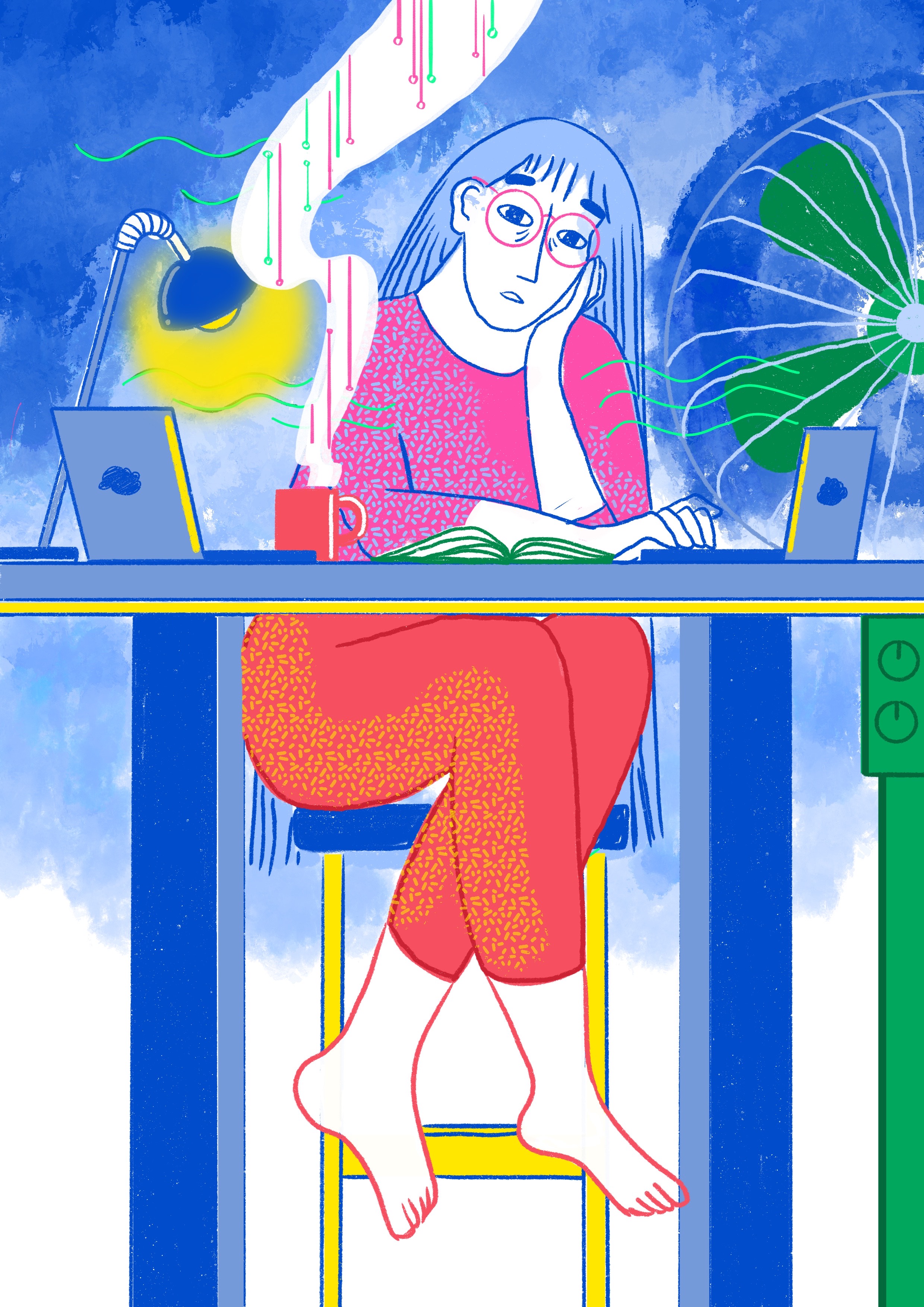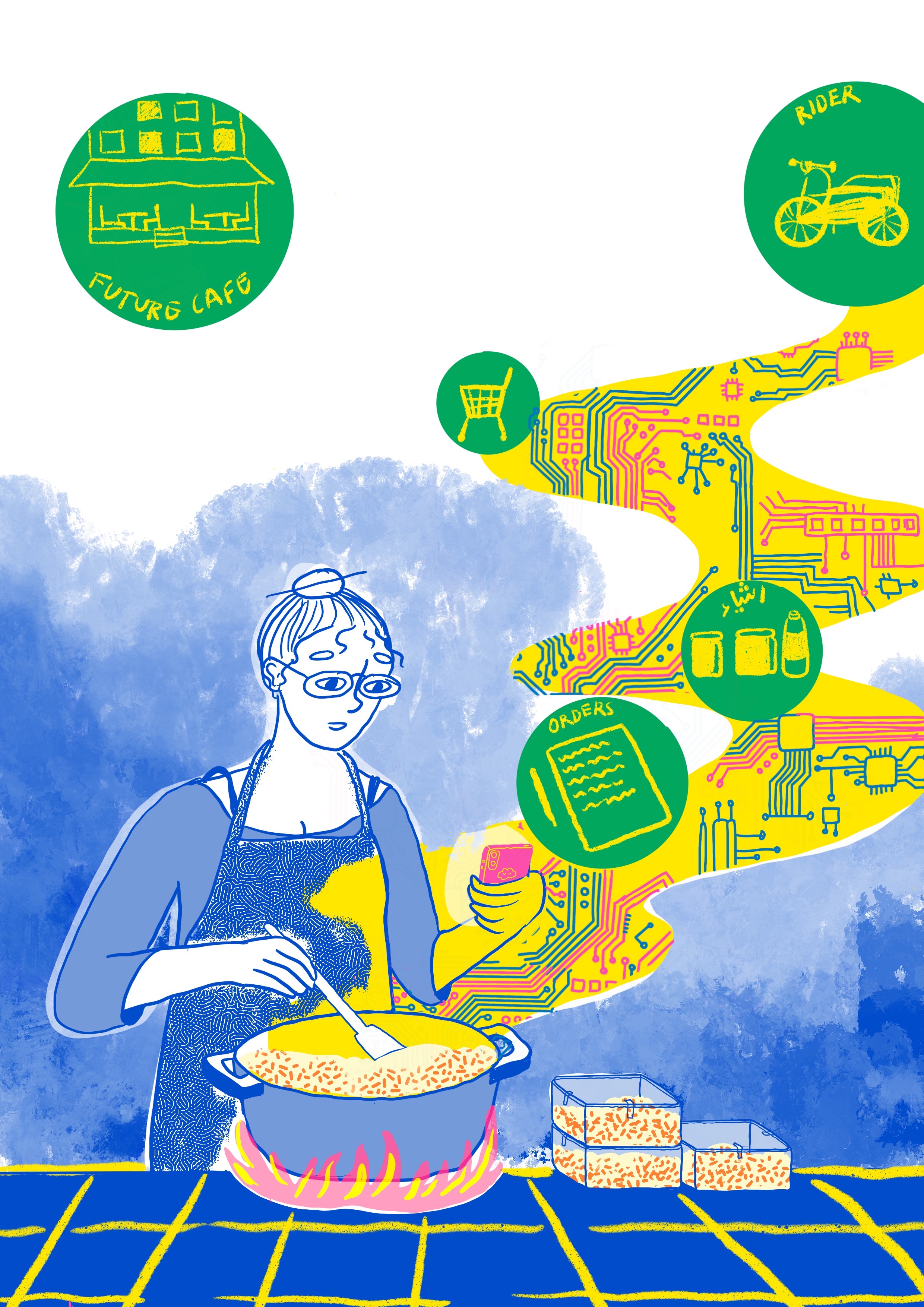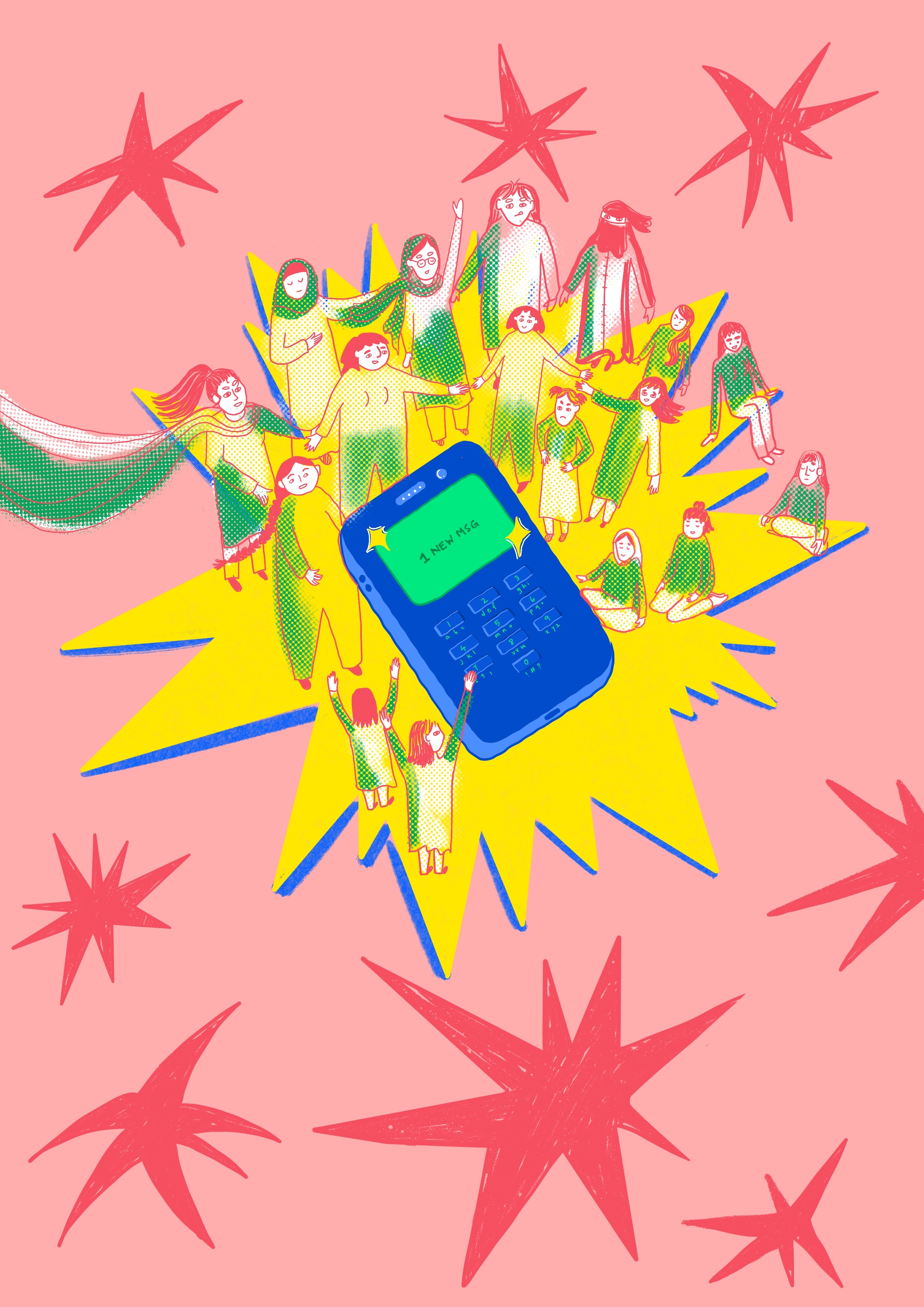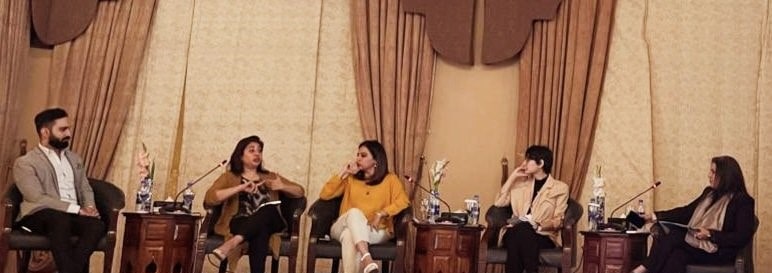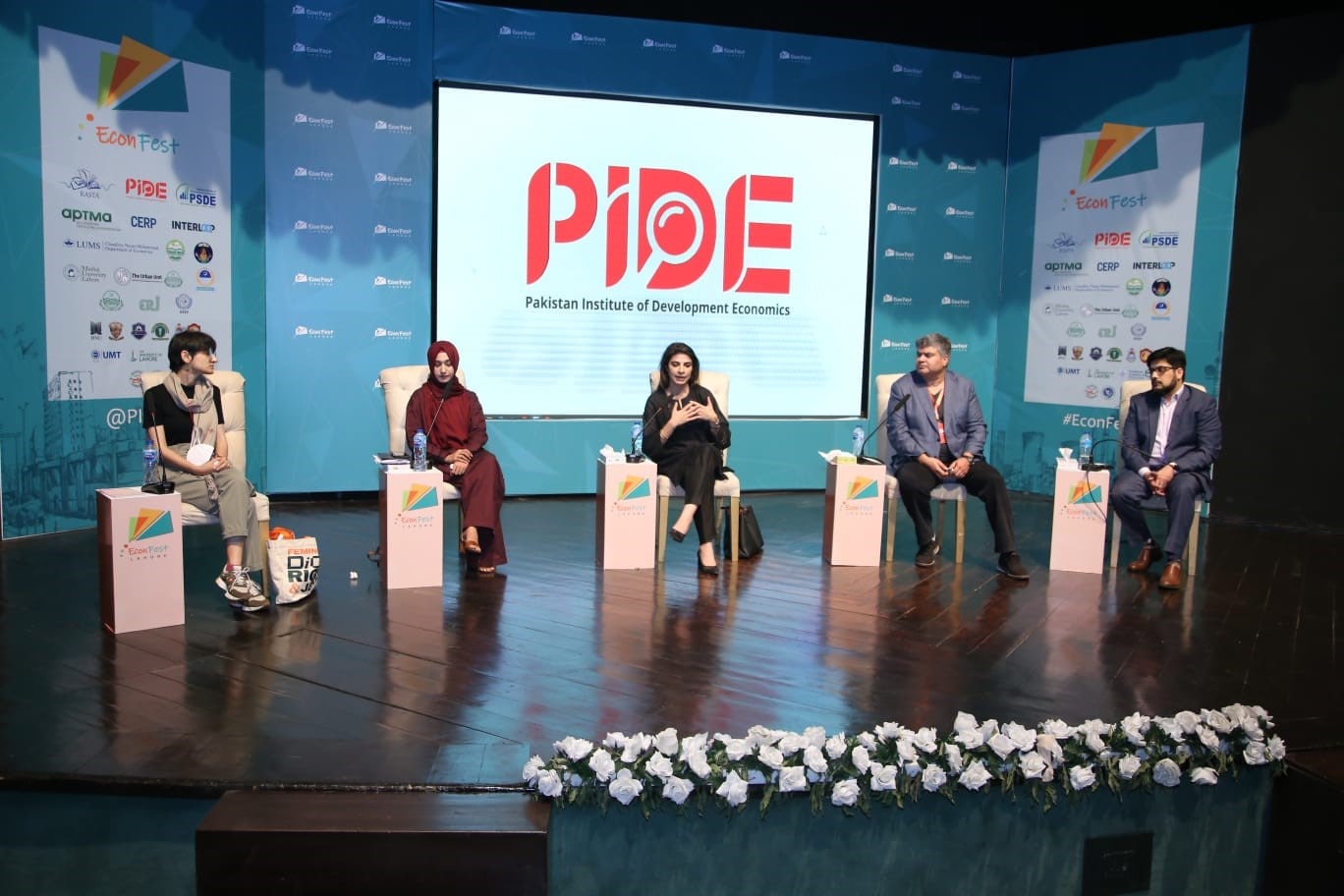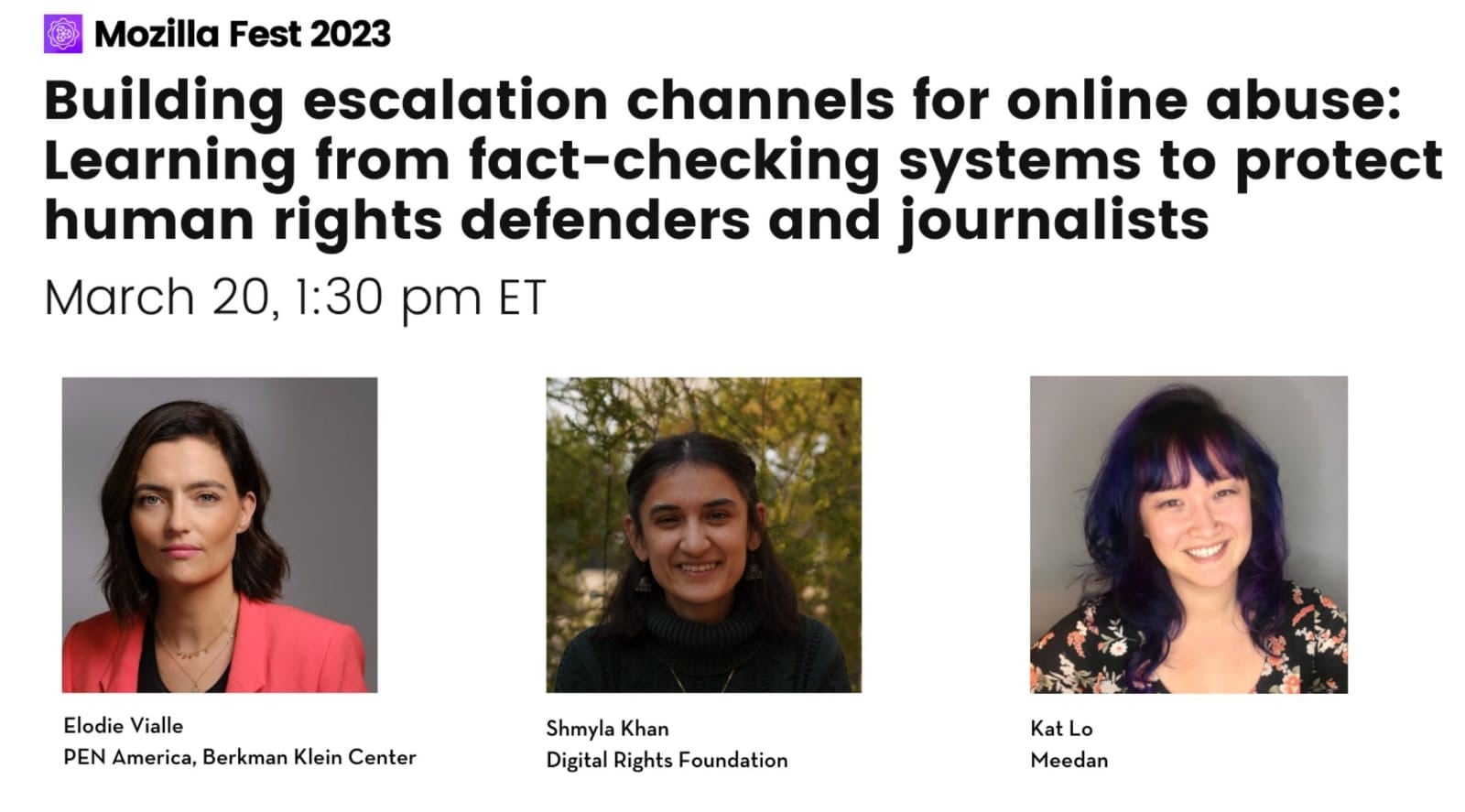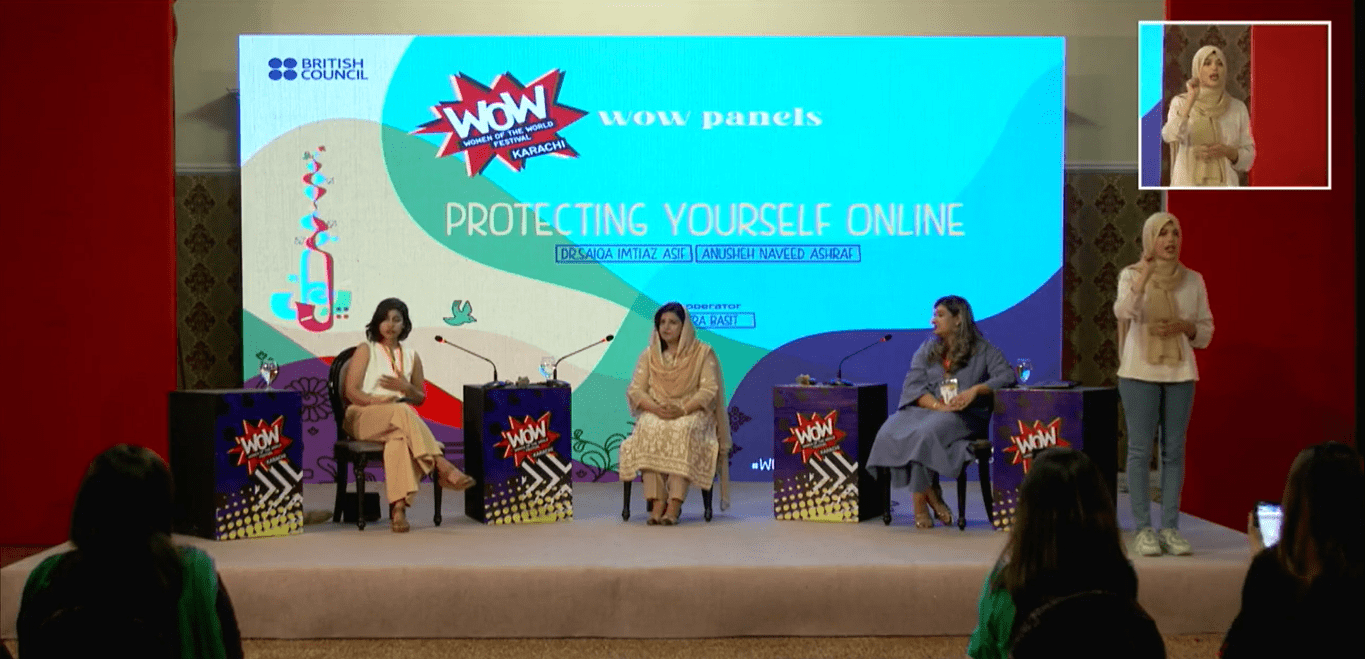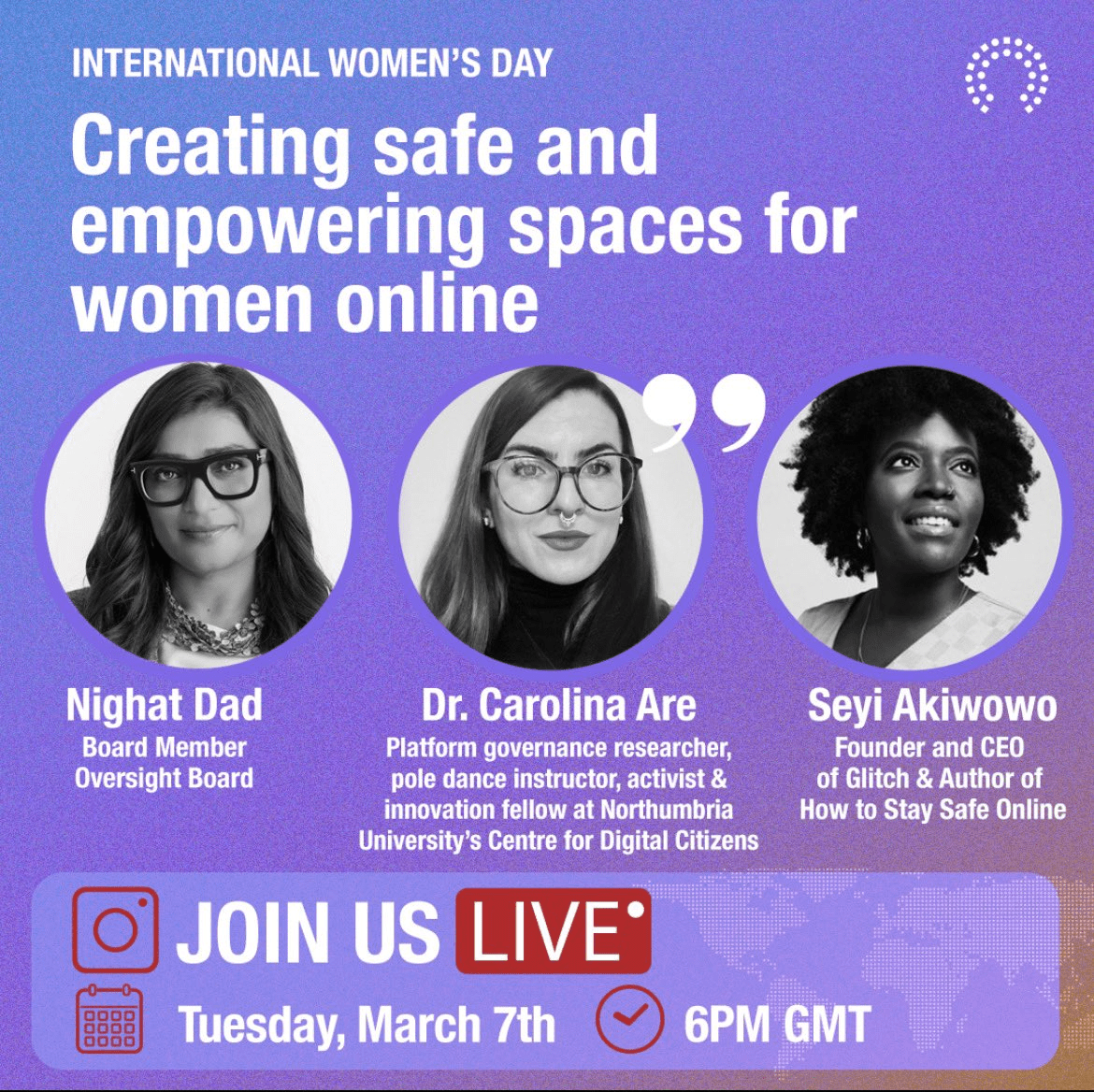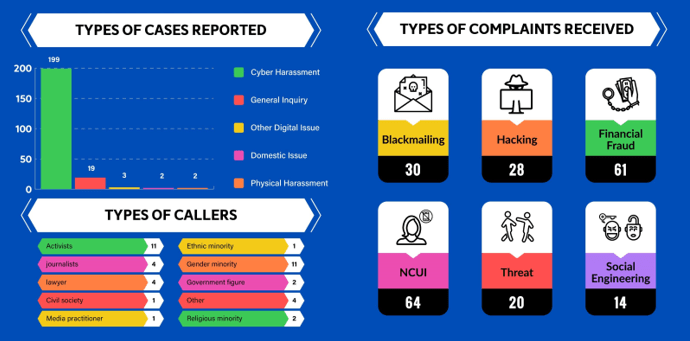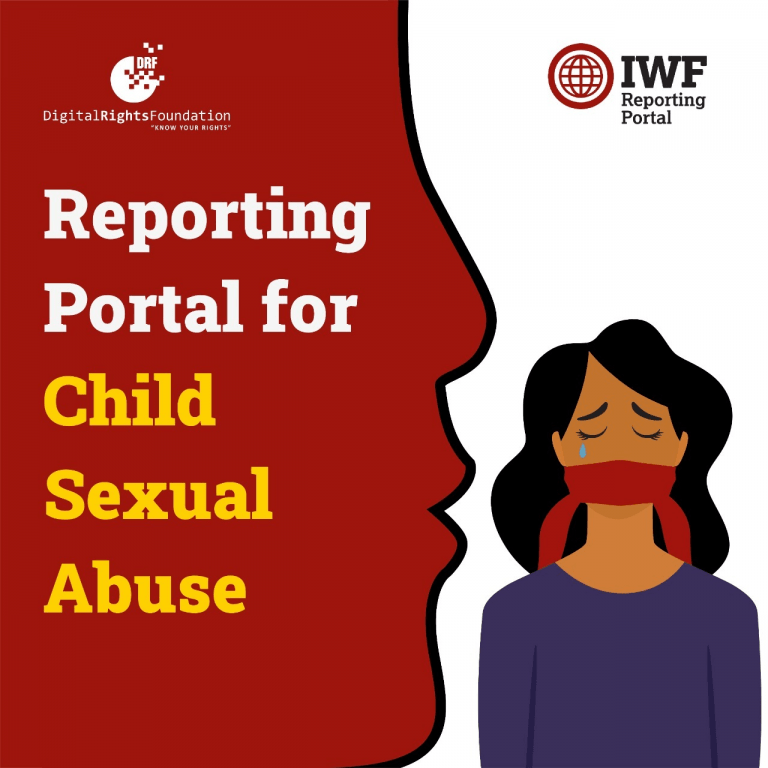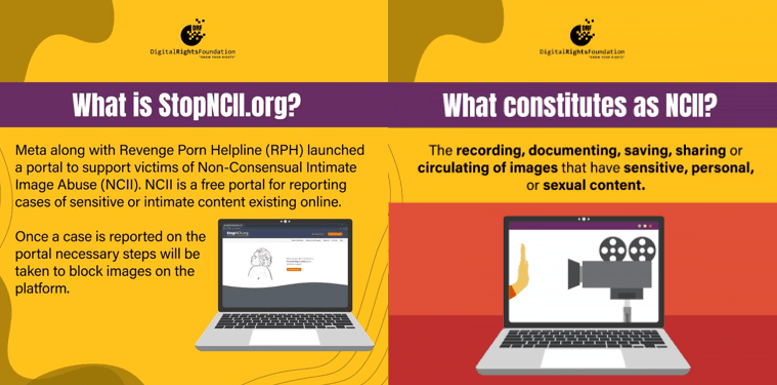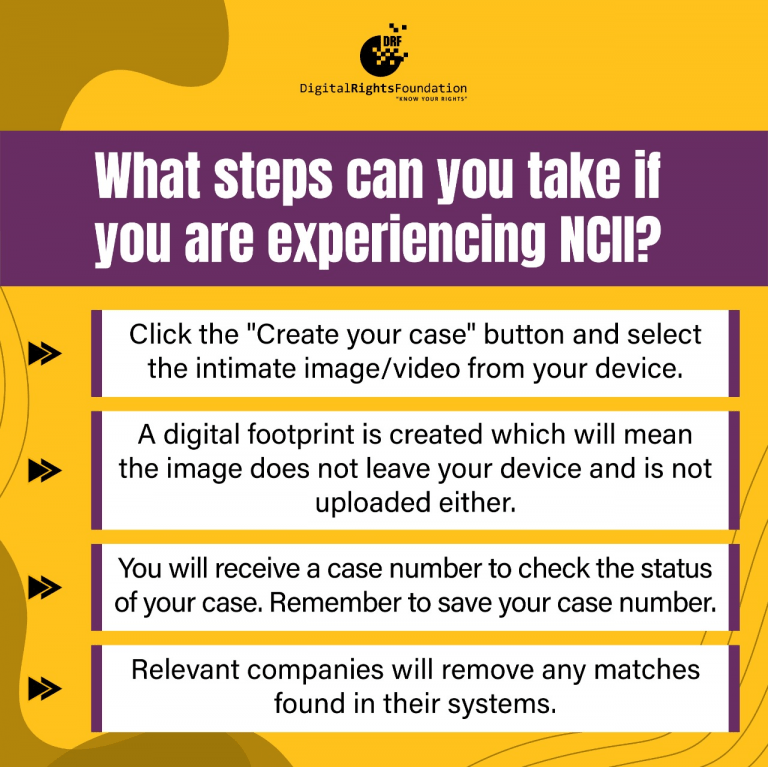April 28, 2023 - Comments Off on جدید ٹیکنالوجی، معاشی خودمختاری اور قبائلی خواتین
جدید ٹیکنالوجی، معاشی خودمختاری اور قبائلی خواتین
خالدہ نیاز
میں نے جب صحافت کے شعبے میں قدم رکھا تو میں بہت ڈری ہوئی تھی کہ کس طرح کام کروں گی، پھر مجھے ڈیجیٹل سکلزٹریینگ لینے کا موقع ملا جس نے میرا کام بہت آسان کردیا کیونکہ اس کی بدولت میں گھرمیں بیٹھے کسی سے بھی فون پر بات کرکے سٹوری فائل کرسکتی ہوں اس کے علاوہ قبائلی اضلاع کی خواتین کے مسائل کو بلاگز کے ذریعے بھی اجاگر کررہی ہوں، ڈیجیٹل سکلز نے نہ صرف میرا کام آسان کردیا ہے بلکہ یہ میری کمائی کا بھی ذریعہ بن گیا ہے''
یہ کہنا ہے سب ڈویژن حسن خیل سے تعلق رکھنے والی شمائلہ آفریدی کا جو پچھلے چار سال سے صحافت کے شعبے وابستہ ہے۔ شمائلہ آفریدی کا کہنا ہے کہ ٹیکنالوجی ٹیلنٹ کو رائیگاں نہیں ہونے دیتی۔ شمائلہ آفریدی کا کہنا ہے کہ قبائلی علاقوں میں خواتین صحافی نہ ہونے کے برابر ہے جس کی وجہ سے انہوں نے سوچا کیوں نہ صحافت کے ذریعے خواتین کی آواز بن جائیں۔
بلاگ لکھنا میرے لئے بہت اچھا ثابت ہوا کیونکہ خواتین کے وہ مسائل جن کو ویڈیوز یا سٹوریز کے ذریعے اجاگر کرنا مشکل تھا انکو میں بلاگزکی مدد سے شیئر کرتی ہوں، اس سے نہ صرف اپنے علاقے کی نمائندگی کا موقع ملا بلکہ خواتین کے مسائل پر کھل کراظہارکرتی ہوں'
ٹیکنالوجی کے ذریعے آپ پوری دنیا سے جڑ سکتے ہیں: شمائلہ آفریدی
شمائلہ آفریدی کا کہنا ہے کہ جدید دور ہے دنیا گلوبلائز ہوچکی ہے زندگی کی دوڑ اب ٹیکنالوجی پر انحصار کرتی ہے۔ ٹیکنالوجی کے ذریعے اپ پوری دنیا سے جڑ سکتے ہیں۔ ٹیکنالوجی نےلوگوں کی زندگیوں اور کام کو بہت اسان بنادیا ہےلیکن قبائلی علاقے کی بات کروں تو خواتین ایسی سہولیات سے محروم ہیں۔ پہلی وجہ تو یہ ہےکہ خواتین کو کبھی ایسی سہولیات اور مواقعوں کی اگاہی فراہم ہی نہیں کی گئی ہے جن سے خواتین استفادہ حاصل کریں۔ ڈیجیٹل اسکلز کیلئے پہلے اعلیٰ تعلیم کے مواقع ہونا ضروری ہیں لیکن قبائلی علاقوں میں اعلی تعلیمی ادارے موجود نہیں ہیں اگر ہیں بھی تو وہاں بھی کوئی ایسی ٹیکنالوجی یعنی کمپیوٹر وغیرہ کی ٹریننگ نہیں دی جاتی ،دوسری اہم سہولت بجلی ہے جب بجلی نہیں ہوگی تو یہاں پر ٹیکنالوجی سے جڑے آلات کا استعمال مشکل ہے۔ یہاں میل کیلئے ڈیجٹل ٹیکنالوجی ٹرینگ نہیں دی جاتی تو خواتین کو مواقع دینا توبہت دور کی بات ہے۔۔۔
شمائلہ آفریدی کے مطابق بہت سی خواتین ہیں جن کے پاس مختلف سلاہی کڑھاہی دستکاری کرنے کا ہنر موجود ہے وہ بہت محنت کرتی ہیں لیکن بہتر مواقعے نہ ہونے کی وجہ ان کو محنت کا وہ پھل نہیں ملتا جنکی کی وہ حقدار ہے۔
دوسری طرف خواتین کے ہاں ٹیکنالوجی کی سہولیات نہ ہونے کی ایک اہم وجہ روایات بھی ہے، لوگ اپنی بیٹیوں، بہنوں کو تعلیم دلانے کے حق میں نہیں ہیں تو جدید ٹیکنالوجی استعمال کرنے کی اجازت کس طرح دیں گے؟
کیا کلچر کی وجہ سے قبائلی خواتین ٹیکنالوجی سے محروم ہیں؟
شمائلہ آفریدی نے بتایا کہ یہ بات ٹھیک ہے کہ کلچر کی وجہ سے قبائلی خواتین جدید ٹیکنالوجی سے محروم ہیں لیکن اگر حکومت آگاہی دیتی اور تعلیم کا نظام ناقص نہ ہوتا تو شاید قبائلی خواتین بھی ملک کے باقی حصوں کی طرح ڈیجیٹل ٹیکنالوجی کی سہولیات سے استفادہ حاصل کرتیں۔
جدید ٹیکنالوجی کی اہمیت کے حوالے سے بات کرتے ہوئے شمائلہ آفریدی نے کہا کہ موجودہ دور میں اگر اپ کے پاس اسکلز موجود ہوں تو اپ آن لائن ٹریننگ لیکر گھر بیٹھے کمائی کرسکتے ہیں لیکن بدقسمتی سے قبائلی علاقوں میں حکومت نے کوئی توجہ نہیں دی ہے، ان کو ان تمام سہولیات سے محروم رکھا گیاجن کی بنا پر وہ ترقی کرسکیں ۔ سب سے زیادہ ظلم حکومت قبائلی خواتین کے ساتھ کررہی ہے اگر بجلی ہوتی، اعلی تعلیمی ادارے ہوتے، اگاہی ہوتی تو شاید قبائلی خواتین ٹیکنالوجی کا استعمال کرکے ترقی کی راہ پر گامزن ہوتیں۔۔۔
شمائلہ آفریدی سمجھتی ہیں کہ قبائلی خواتین ہمیشہ سے صنفی امتیاز کا شکار رہی ہیں۔ ان کو تعلیمی مواقع میسر نہیں ہیں، کئی سماجی مسائل کا شکار ہیں، ان کی کوئی اواز نہیں۔ ایسی خواتین بھی ہیں جن کا کسی نہ کسی حوالے سے زندگی میں اہم کردار رہا ہے لیکن ان کے ٹیلنیٹ کو نظر انداز کیا گیا ہے اس لیے میں کوشش کرتی ہوں کہ ان کی ایسی کہانیاں سامنے لاؤں جو دوسروں کیلئے ایک مثال بنے۔
مریم آفریدی کس طرح قبائلی اضلاع کی خاتون مکینک بنی؟
شمائلہ آفریدی ان چند خواتین میں سے ہیں جن کو ڈیجٹیل سکلز ٹریننگ لینے کا موقع ملاتاہم ہزاروں خواتین جدید ٹیکنالوجی کی سہولیات سے محروم ہیں۔ ان میں سے ایک 35 سالہ مریم آفریدی بھی ہے، مریم آفریدی پہلی قبائلی خاتون مکینک ہونے کا اعزاز بھی حاصل کرچکی ہے تاہم وہ جدید ٹیکنالوجی کی سہولیات سے محروم ہے۔
مریم افریدی سلائی چھوڑنے، دھاگہ ٹوٹنے، جمپ سٹیچجنگ اور سوئی ٹوٹنے کے اسباب , مختلف مشینوں اور ان کے افعال اور استعمال کو سمجھنے کے ساتھ ساتھ دوسرے الیکٹرک الات بیٹریز، استری ، لائٹس وغیرہ میں فنی خرابی کو ٹھیک کرنے کی مہارت سیکھ چکی ہے۔
مریم افریدی کہتی ہے کہ وہ جب سلائی کرتی تھی تو مشین میں اکثر فنی خرابی پیدا ہوجاتی تھی جسے باہر مارکیٹ لےجانابہت مشکل ہوتا تھا ۔ایک دن سوچا کہ کیوں نہ میں خود ہی تجربات کرکے فنی خرابی کوٹھیک کرنے کا ہنر سیکھ لوں اور پھر ایک خراب مشین کو بار بار کھولتی رہی اور ٹھیک کرتی رہی اس جہدو جہد میں کافی وقت لگا لیکن کچھ حد تک میں کامیاب ہوگئی تھی۔ نہ تو پڑھی لکھی ہوں اور نہ ہی کوئی ٹیکنیکل ٹریننگ لی ہے اور نہ کوئی ایسی سہولیات یا ٹیکنالوجی موجود ہے، اپنے ہی دماغ کا استعمال کرکے ٹیکنیکل الات کو ٹھیک کرنے کا ہنر سیکھ لیا ہے۔
مریم آفریدی کا کہنا ہے کہ علاقے کی خواتین کیلئے کافی اسانی ہوچکی ہے ان کے گھر میں بجلی کی پیٹنگ کروانی ہو کوئی الات میں فنی خرابی ہوں تو وہ مارکیٹ جانے کی بجائے میرے پاس لے اتی ہے، دور دور سے لوگ اپنی خراب مشینیں لیکر اتے ہیں، لوگوں کا مجھ پر اعتماد بڑھ گیا ہے۔۔۔
مجھے ایسے جدید الات چاہیئے جو میرے کام کو اسان بنادے۔
مریم کہتی ہیں کہ جدید ٹیکنالوجی نے دنیا کو تبدیل کردیا ہے، اج دنیا کی ہر چیز سائنس کے تابع ہوچکی ہے لیکن بدقسمتی سے قبائلی علاقوں میں لڑکیاں پانچویں تک تعلیم بھی بہت مشکل سے حاصل کرتی ہیں وہ بھی اتنی ناقص دی جاتی ہے کہ نہ تو والدین چاہتے ہیں کہ مزید بچوں کو تعلیم دی جائے اور نہ ہی سرکاری ٹیچرز بچوں پر کوئی توجہ دیتے ہیں ایسے حالات میں ہم اعلیٰ ٹیکنالوجی تک کیسے پہنچ سکتے ہیں؟
''اپنے ذہن کا استعمال کرکے میکنک تو بن چکی ہوں لیکن مجھے ایسے جدید الات چاہیے جو میرے کام کو اسان بنادیں، میں جب بکرم لگاتی ہوں کاج کرتی ہوں تو چوبیس گھنٹے میں دو گھنٹے بجلی اتی ہے وہ بھی نہ ہونے کے برابر ہوتی ہےجس کے لیے مجھے طویل انتظار کرنا پڑتا ہے، مجھے سولرائزڈ استری کی ضرورت ہے اگر میرے پاس جدید سولرائزڈ استری موجود ہوتی تو میرا کام مزید اسان ہوجاتا لیکن اس کی قیمت ایک لاکھ روپے ہے'' مریم آفریدی نے کہا۔
مریم آفریدی اگر پڑھی لکھی ہوتی تو شاید آج ایک انجینئر ہوتی اس کے علاوہ وہ سلائی بھی کرتی ہے تو اگر انکے پاس ڈیجیٹل سکلز ہوتے تو وہ اچھے ڈیزائنز کے کپڑے سیتی اور انکو آن لائن فروخت بھی کرتی،اگر مشینوں فنی خرابی ہوتی تو میں یوٹیوب سے دیکھتی اور اور خواتین کو بھی یہ سکلز دیتی۔
مریم افریدی کہتی ہیں کہ ہم قبائلی خواتین اعلیٰ صلاحیتوں کی مالک ہیں، ہم سب کچھ کرسکتی ہیں جو دوسری خواتین کرتی ہیں اگر ہم پہاڑوں کی چٹانوں سے لکڑیاں کاٹ کر لاسکتی ہیں تو اعلیٰ تعلیم اور مختلف شعبوں میں کام کیوں نہیں کرسکتیں؟ لیکن بات وہی ہے کہ ہمارے پاس کوئی مواقعےنہیں ہے توجہ نہیں ہے۔۔۔۔
اگر قبائلی علاقوں میں ٹیکنالوجی موجود ہوتی اسکے استعمال کی ٹریننگ دی جاتی تو بہت سی خواتین استفادہ حاصل کرتیں، جہاں وہ خودمختار ہوتیں اور گھر کے معاشی سرگرمیوں میں بھر پور حصہ لیتیں لیکن ہم پتھرکے زمانے میں رہ رہے ہیں جہاں جدید ٹیکنالوجی ہماری پہنچ سے بہت دور ہے۔
2017 کی مردم شماری کے مطابق قبائلی ضلاع کی آبادی 5001676 ہے جن میں 2445357 خواتین شامل ہیں، تاہم مقامی ذرائع کا کہنا ہے کہ قبائلی اضلاع کی آبادی ایک کروڑ ہے جس میں آدھی آبادی خواتین کی ہے۔
ہم وہ لوگ ہیں جن سے ٹیکنالوجی ہضم نہیں ہوتی: نوشین فاطمہ
سماجی کارکن نوشین فاطمہ ضلع اورکزئی سےتعلق رکھتی ہیں وہ کہتی ہیں کہ اس میں کوئی شک نہیں ہے ساری دنیا ڈیجیٹلائز ہوچکی ہےاور سارے لوگ جدید ٹیکنالوجی کا استعمال کررہے ہیں، اگر کوئی شخص انٹریٹ کی دنیا سے انکاری بھی ہے تاہم پھر بھی وہ اس کا استعمال کرتا ہے۔ نوشین فاطمہ نے بتایا کہ ہم وہ لوگ ہیں جن سے ٹیکنالوجی ہضم نہیں ہوتی، ہمارے ہاں ایک طبقہ ایسا بھی ہے جو یہ سمجھتا ہے کہ انٹرنیٹ اور جدید ٹیکنالوجی ہمیں دین سے دورلے جانے کی ایک سازش ہے، پہلے جب ریڈیو، ٹی وی آیا تو بھی ان لوگوں سے یہ ہضم نہیں ہورہے تھےلیکن جب ایک کے بعد دوسری ٹیکنالوجی آتی ہے تو یہ لوگ پہلے سے موجود ٹیکنالوجی کو مجبوراً قبول کرلیتے ہیں اور نئی جو چییز آئی ہوتی ہے اس کے خلاف ہوجاتے ہیں۔
نوشین فاطمہ نے کہا کہ یہ ہماری بدقسمتی ہے کہ ہم نے ٹیکنالوجی کو نہ تو قبول کیا اور نہ ہی اس سے اس طرح استفادہ حاصل کیا جس طرح باقی اقوام نے اس سے فائدہ اٹھایا، نوشین فاطمہ کے مطابق ہمارے ہاں خواتین کو جدید ٹیکنالوجی سے بہت دور رکھا گیا ہےجس کی وجہ سے بچے بھی اس ٹیکنالوجی سے دور رہتے ہیں کیونکہ انکی ماوں کو اس کے حوالے سے معلومات نہیں ہوتی اور یوں ان بچوں کا بھی کافی سارا وقت ضائع ہوجاتا ہے۔
نوشین کا کہنا ہے کہ قبائلی خواتین میں ٹیلنٹ کی کوئی کمی نہیں ہے، یہاں کی خواتین ہاتھوں سے ایسے شاہکار بناتی ہیں کہ جس کو بندہ دیکھ کے دنگ رہ جائے لیکن مسئلہ یہ ہے کہ ان خواتین کو ڈیجیٹل سکلز نہیں آتے، انکو نہیں پتہ کہ اکاؤنٹ کیسے بناتے ہیں، پھر اس پہ کس طرح اپنی ہاتھ کی بنائی ہوئی چیزوں کو ڈال کہ مہنگے داموں آن لائن بیچ سکتی ہیں اور اپنی محنت کے مطابق کمائی کرسکتی ہیں۔'' قبائلی خواتین کے پاس ہنر تو ہے لیکن اس ہنر کو کارآمد بنانے کا طریقہ نہیں آتا، انکو نہیں پتہ کہ کس طرح اس کو آن لائن کاروبار میں پروان چڑھاسکتی ہیں، اگر قبائلی خواتین کو ڈیجیٹل سکلز دیئے جائے تو اس سے وہ معاشی طور پر خودمختار ہوسکتی ہیں کیونکہ بہت ساری بچت بھی ہوگی اور اچھی کمائی کرپائیں گی، معاشی خودمختاری سے انتہاپسندی کی کمر بھی ٹوٹ سکتی ہے
''
جدید ٹیکنالوجی اور مذہبی رنگ
نوشین فاطمہ کے مطابق جدید ٹیککنالوجی اس دور کی ضرورت بن چکی ہےلیکن ہماری ہاں بدقسمتی سے اس کو مذہبی رنگ بھی دیا جاتا ہے اور روایات سے بھی جوڑا جاتا ہے، ایک مسئلہ یہ بھی ہے کہ 98 فیصد لوگ اس کا صحیح استعمال بھی نہیں کرتے، وہ اس کو فائدے کے لیے استعمال نہیں کرتےحالانکہ آجکل کے دور میں اس سے بے روزگاری کم کرنے میں بھی بہت مدد مل سکتی ہے۔
نوشین فاطمہ کا کہنا ہے کہ قبائلی خواتین کو جدیدڈیجیٹل سکلز کے ٹریننگز دینی چاہیۓ لیکن اس میں اس بات کا خیال رکھنا ضروری ہے کہ زبان ایسی ہو جو ان خواتین کو سمجھ میں آسکے اور ساتھ میں آن لائن ٹریننگز کا فائدہ کم ہوگا کیونکہ قبائلی اضلاع میں انٹرنیٹ صحیح کام نہیں کرتا، اور اس بات کا بھی خیال رکھنا ضروری ہے کہ ان خواتین کو گراس روٹ سے چیزیں سکھائی جائیں کیونکہ ان کو اس جدید ٹیکنالوجی کا کچھ پتہ نہیں ہے۔
مردان سے تعلق رکھنے والے صحافی افتخار خان جو قبائلی علاقوں کےحوالےسے کافی ریڈیو پروگرامز پروڈیوس کر چکے ہیں کا کہنا ہے کہ ہم لوگ ٹیکنالوجی کو انٹرنیٹ وغیرہ سے منسوب کرتے ہیں حالانکہ ایسا نہیں ہے ٹیکنالوجی ہماری روزمرہ زندگی میں ہراس چیز میں نظر آتی ہے جس نے ہماری زندگیوں کو آسان بنادیا ہے، چاہے وہ سولر سسٹم ہو، انٹرنیٹ کے بغیر کمپیوٹر کا استعمال ہو یا پھر واشنگ مشین ہولیکن اگر دیکھاجائے تو قبائلی خواتین ٹیکنالوجی سے بہت دور ہے، قبائلی علاقوں میں آج بھی بہت زیادہ خواتین دشوار گزار پہاڑی راستوں پہ چل کے سروں پہ پانی لاتی ہیں۔ حالانکہ جدید ٹیکنالوجی نے پانی کے حصول کو کافی آسان بنادیا ہے، اس کے علاوہ قبائلی علاقوں میں بجلی نہیں ہے جوکہ سولر سسٹم لگانے سے حل ہوسکتا ہے لیکن پھر بھی یہ خواتین اس سہولت سے بھی محروم ہیں۔
قبائلی اضلاع کی خواتین اب بھی 1980 والی زندگی گزار رہی ہیں
افتخار خان کے مطابق قبائلی اضلاع کی خواتین اب بھی 1980 والی زندگی گزار رہی ہیں، سیٹلڈ ایریاز میں اب خواتین کی زندگی میں ٹیکنالوجی کی وجہ سے کافی تبدیلیاں اور آسانیاں آچکی ہیں لیکن قبائلی خواتین ان تمام بنیادی سہولیات سے محروم ہے۔ افتخار خان کا کہنا ہے کہ قبائلی خواتین کی آن لائن موجودگی اور آن لائن چیزوں تک انکی رسائی نہ ہونے کے برابر ہے'' جب کرونا وائرس آیا تو اس میں ہم نے دیکھا کہ آن لائن کلاسز لینے میں طلباء کو بہت زیادہ مشکلات کا سامنا تھا کیونکہ قبائلی اضلاع میں انٹرنیٹ کام نہیں کرتا، حکومت نے خود قبائلی اضلاع میں انٹرنیٹ کو غیرفعال کیا ہواہے جس سے طلباء براہ راست متاثر ہوئے، مرد تو چلو پھر بندوبستی علاقوں میں چلے جاتے ہیں لیکن خواتین کے لیے انٹرنیٹ تک رسائی بہت مشکل ہے''
افتخار کے مطابق آج کل آن لائن کاروبار بہت زیادہ ترقی کررہے ہیں ، جو لوگ آن لائن کاروبار نہیں بھی کرتے تو وہ بھی کسی نہ کسی لیول پر آن لائن سائیڈ پر کام کررہے ہیں تو قبائلی خواتین کے لیے آن لائن کاروبار کرنا ایک بہت اچھا موقع ہے۔ '' پختون معاشرے اور خاص کرقبائلی اضلاع میں کسی خاتون کے لیے کاروبار کرنا آسان نہیں ہے بلکہ وہ سوچ بھی نہیں سکتی لیکن آن لائن وہ نہ صرف کاروبار کرسکتی ہیں بلکہ وہ اپنے پروڈکٹ کی تشہیر بھی اسانی سے کرسکتی ہیں''
انہوں نے کہا کہ ریاست نے قبائلی خواتین کی زندگی تبدیل میں کوئی دلچسپی نہیں لی اگر ہم روایات کو کوستے ہیں تو اس سے پہلے ہمیں یہ بھی سوچنا چاہئے کہ ریاست نے ان خواتین کی زندگی میں بہتری لانے کے لیے کیا اقدامات کیے یا فاٹا مرجر کے بعد کیا کیا۔
پاکستان میں ڈیجیٹل گیپ بہت زیادہ ہے
ضلع خیبرلنڈی کوتل سے تعلق رکھنے والی اسسٹنٹ پروفیسر عروج نثار سمجھتی ہیں کہ آج کے دور میں جدید ٹیکنالوجی کی وجہ سے ان قوموں نے ترقی کی ہے جنہوں نے اس کا صحیح استعمال کیا ہے چاہے وہ تعلیم میں ہو یا روزگار میں۔ ان کا کہنا ہے کہ پاکستان میں ڈیجیٹل گیپ بہت زیادہ ہے بہت کم لوگ ہیں جو ٹیکنالوجی سے فائدہ اٹھارہے ہیں جبکہ زیادہ تعداد میں لوگوں کی ٹیکنالوجی تک رسائی نہیں ہے اور نہ ہی انکو اس کا استعمال آتا ہے، پھر اگر خواتین کی بات کی جائے تو وہ جدید ٹیکنالوجی سے بہت دور ہیں جس کی کئی وجوہات ہیں، لوگوں کا خیال ہے کہ اگر خواتین کو ٹیکنالوجی تک رسائی دی جائے تو خواتین خودمختار ہوجائیں گی اور وہ اپنے لئے فیصلے کرپائیں گی اور وہ اس بات سے ڈرتے ہیں اس وجہ سے خواتین کو اس سے دور رکھنا چاہتے ہیں۔
عروج نثار کا کہنا ہے کہ قبائلی خواتین کی نہ تو انٹرنیٹ تک رسائی ہے اور نہ ہی ڈیوائسز تک،انکے پاس صرف سادہ موبائل ہوتے ہیں اور وہ بھی صرف ضرورت کی حد تک استعمال کرتی ہیں، ہمارے ہاں خواتین کا موبائل یا لیٹ ٹاپ استعمال کرنا بھی معیوب سمجھاجاتا ہے۔ ان کا کہنا ہے کہ آجکل کے دور میں معلومات تک رسائی بنیادی حقوق میں سے ایک ہےاور ایسا ڈیجیٹل ٹیکنالوجی کی بدولت ہی ممکن ہے۔
عروج نثار نے کہا کہ ہم اپنی قبائلی خواتین کو معاشی طور پرخودمختار بناسکتے ہیں لیکن اس کے لیے ضروری ہے کہ انکو ڈیجیٹل سکلز دیئے جائے اور جدید ٹیکنالوجی تک انکی رسائی ممکن بنائی جائے۔

